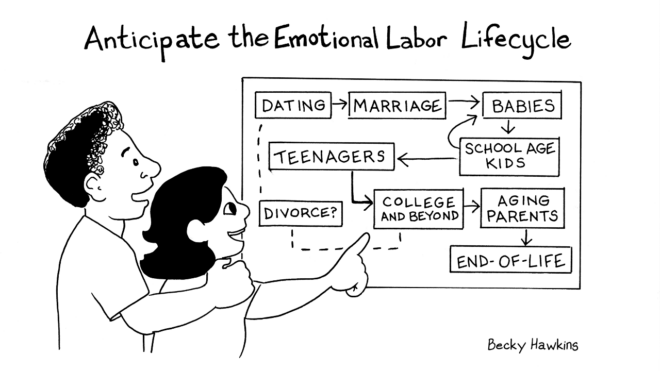By Regina F. Lark, Ph.D.
October 31, 2022
From Work-Life Balance to Life Integration: 4 Strategies Toward Gender Equity at Home
Recently I’ve had conversations with women lawyers about so-called “work-life balance.”
Here are some sound bytes:
- Cecelia: My husband helps a lot around the house but I’m the one who’s exhausted after being gone all day and taking care of the house and everything at night. I have absolutely no work-life balance.
- Jennifer: I’m the bigger wage-earner and work from home. My husband is an engineer who works outside of the home. I’m overwhelmed by the volume of work with two toddlers at home and am already anticipating how much more work I’ll have when they get older and need to get chauffeured to plays dates and extra-curriculars. Since I work from home, it’s going to fall on me. I can’t remember a time when I had any balance in my life, and looking ahead, I can’t imagine that it’s going to happen anytime soon.
- Lily: After 12 years I left my firm to raise our son. I think I romanticized how it would be and I was excited to incorporate care-giving with daily yoga practice and planning a delicious and nutritious dinner. It makes me cringe now. When my husband gets home from work, he asks, “What did you do all day?” Feeling like I need to defend myself, I run down the long long list of tasks, but would rather reply with, “I kept our son alive another day.” There is no balance. Never was. Never will be.
Cecelia, Jennifer and Lily are smart and accomplished. One was managing editor of Law Review, one made partner in an all-male firm, and just before Lily left her firm, she settled a multi-million claim favoring her client. These women are bad-ass. They carry the bulk of the physical and emotional labor at home. They are on edge, tired, and pissed-off. And they have a lot to do. Always.
Maybe I’m too literal because I’m not quite sure of the meaning of “work-life balance.” First the words “work” and “life,” as if one is so separate from the other. Doesn’t “life” contain a lot of work? Isn’t work a big part of life?
And don’t get me started on the word “balance.” Have you ever tried to balance something? It takes patience, insight, mindfulness, and, well a lot of work, to get to balance. Attempting to ‘balance’ anything within the messiness of life is, I think, asking a lot. The 24/7 ‘to do’ list is not going away (or checked-off!) any time soon, but we need strategies to reign in the volume of work and associated resentments.
I’ve come to replace the word “balance” with “integrate” because that is exactly what I’m trying to do. I want to integrate into my life all the things that matter to me, with all the components of what is available to me.
Cecelia, Jennifer and Lily all live with husbands and children. They expressed satisfaction with, and a great deal of love for, their families. What they crave are different conversations about how to find that integration. What I told them is that one can achieve life integration once the family embraces a desire for gender equity at home.

Toward Gender Equity
It’s time to think and talk differently about what household management actually looks like, and how to make the changes you and your partner wish to incorporate into your daily practice at home. Here are four strategies.
- Deliberate Dialogue –Talk about, lay-out, and describe: Every. Single. Chore. At. Home. All of them. Don’t hold back. And it’s not just the chore itself, e.g., laundry. Each chore has a beginning, a middle, and an end. So laundry involves sorting, washing, drying, folding, putting away. It’s many steps. So when you are thinking about all chores, don’t forget the steps. And is it daily? Weekly? Monthly? Annually?
- Radical Delegation – Forget how you’ve always done things. There’s a new way of doing things and it’s called radical delegation. Instead of delegating a chore to the person best suited to the task, radical delegation says “just get everything done.” If you don’t know to do a task, find instructions on YouTube.
- Household Management – The home is much like any company or corporate entity. It requires a slew of cognitive abilities (time, emotional, financial management, sequencing, noticing, planning, etc.). Managers manage better with a policies and procedures manual in place and Maple, a revolutionary business-to-household digital platform “with a focus on bringing better efficiency and equality to the unpaid labor of managing and planning for the family.” With a few keystrokes the adults in the household can find a plan of action for everything from meal-planning to dividing chores to all things household management.
- Anticipate the Emotional Labor Life-Cycle: Cecelia, Jennifer and Lily described feelings of being ‘blind-sided’ by life. Cecelia said, “There’s ALWAYS something!” Lily told me when her inlaws’ Golden anniversary was nearly upon them, she was blind-sided when she discovered the family was looking for her to make the celebration happen. Jennifer did anticipate an up-coming event – that her children will one-day need rides to play dates – but in her anticipation, she had already determined that it was she who would be inconvenienced when the time came.
Discovering ways to integrate it all: paid/unpaid work, family/friend time, play, and self-care chores (unpaid work!) is a process, and some days it feels like a slog. As with anything worth having, work toward change comes as quickly or as slowly as you seek to implement. A willingness to change, to grow, to establish greater harmony, and love the environment in which you live will make the idea and practice of gender equity a viable part of life at home.
Regina F. Lark, Ph.D.
Posted in:

